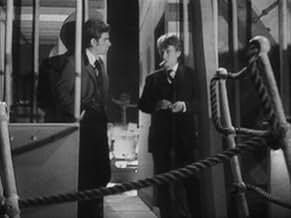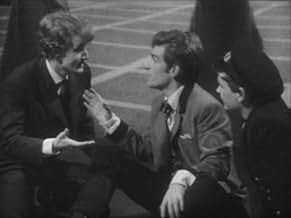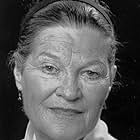No Trams to Lime Street
- Episode aired Mar 18, 1970
- 50m
IMDb RATING
7.4/10
12
YOUR RATING
Three young merchant seamen from Liverpool take shore leave in their home city after three years away.Three young merchant seamen from Liverpool take shore leave in their home city after three years away.Three young merchant seamen from Liverpool take shore leave in their home city after three years away.
- Director
- Writer
- All cast & crew
- Production, box office & more at IMDbPro
Storyline
Featured review
Like "On the Town", "No Trams to Lime Street" deals with three sailors on shore leave in a big city, although in this case the city in question is Liverpool rather than New York. It started life in 1959 as a television play, written by the Welsh-born Liverpudlian playwright Alun Owen for the ITV network as part of its "Armchair Theatre" series. The title refers to a scene in which one of the sailors expresses surprise that there are no more trams in Liverpool. (The city's last trams ran in 1957, but he has been away at sea for two years. Lime Street is the city's main railway station).
In 1965 a new version of the play was made by the BBC for BBC2's "Theatre 625", and a third, also produced by the BBC, was made in 1970, for the "Wednesday Play" series. It was later repeated as a "Play for Today", the title of BBC1's flagship drama series having changed in the interval. This is the only version which still exists, the two earlier ones being lost, and even this one survives only in black and white, although it was originally shown in colour. (The same is true of some other "Wednesday Plays" and "Plays for Today" from this period, such as "Robin Redbreast" and "The Long-Distance Piano Player").
This version keeps Owen's original title and the line about there being no more trams, which presumably means that the action is supposed to be taking place in the late fifties, but some of the shots we see were obviously taken in the late sixties or early seventies. It follows the adventures of the three sailors, Billy, Cass and Taffy on shore. Billy picks up an attractive girl named Betty, but becomes less keen when he discovers that she is the ex-wife of his old shipmate Ben, who died at sea. Cass and Taffy both have difficult relationships with their fathers- Cass because his father seems to have an obvious preference for his older brother Terry, and Taffy because his father is an officer on the same ship and has difficulties in combining the roles of parent and senior officer.
The play is only fifty minutes long, which I thought was too short to do justice to the stories of all three lads. We never learn very much about their earlier lives, Billy's friendship with Ben, the roots of the rivalry between Cass and Terry or the strained relationship between Taffy and his father. Had the running-time been extended by, say, another twenty or thirty minutes it could have been more interesting as a drama.
What gets the play an above-average mark is the music. I understand that the lost 1959 and 1965 versions were "straight"plays without music, but the 1970 version was turned into a musical. Despite the 1950s setting the music is more typical of sixties or early seventies pop, but it is very tuneful ad enjoyable. Listening to it I thought that this play could easily have been elaborated into a stage musical. The first great Liverpool musical, before Willy Russell's "Blood Brothers". 6/10.
In 1965 a new version of the play was made by the BBC for BBC2's "Theatre 625", and a third, also produced by the BBC, was made in 1970, for the "Wednesday Play" series. It was later repeated as a "Play for Today", the title of BBC1's flagship drama series having changed in the interval. This is the only version which still exists, the two earlier ones being lost, and even this one survives only in black and white, although it was originally shown in colour. (The same is true of some other "Wednesday Plays" and "Plays for Today" from this period, such as "Robin Redbreast" and "The Long-Distance Piano Player").
This version keeps Owen's original title and the line about there being no more trams, which presumably means that the action is supposed to be taking place in the late fifties, but some of the shots we see were obviously taken in the late sixties or early seventies. It follows the adventures of the three sailors, Billy, Cass and Taffy on shore. Billy picks up an attractive girl named Betty, but becomes less keen when he discovers that she is the ex-wife of his old shipmate Ben, who died at sea. Cass and Taffy both have difficult relationships with their fathers- Cass because his father seems to have an obvious preference for his older brother Terry, and Taffy because his father is an officer on the same ship and has difficulties in combining the roles of parent and senior officer.
The play is only fifty minutes long, which I thought was too short to do justice to the stories of all three lads. We never learn very much about their earlier lives, Billy's friendship with Ben, the roots of the rivalry between Cass and Terry or the strained relationship between Taffy and his father. Had the running-time been extended by, say, another twenty or thirty minutes it could have been more interesting as a drama.
What gets the play an above-average mark is the music. I understand that the lost 1959 and 1965 versions were "straight"plays without music, but the 1970 version was turned into a musical. Despite the 1950s setting the music is more typical of sixties or early seventies pop, but it is very tuneful ad enjoyable. Listening to it I thought that this play could easily have been elaborated into a stage musical. The first great Liverpool musical, before Willy Russell's "Blood Brothers". 6/10.
- JamesHitchcock
- May 2, 2024
- Permalink
Details
Contribute to this page
Suggest an edit or add missing content








